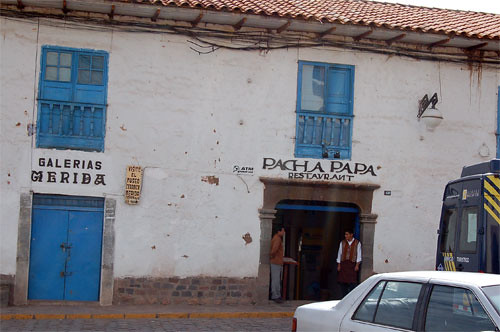 On our recent trip to Peru, the Pretty Lady and I were often at a slight loss in Cusco when it came to meal times. We were on a relaxed holiday, electing to play it by ear, so we couldn't eat at restaurants where we needed to make a reservation at (we missed eating at Cusco's best restaurant, Cafe MAP, because of this). No matter - Cusco is full of eateries, ranging from tourist traps that haul in unsuspecting gringos (or chinos like us) to homestyle joints that serve local food for cheap prices to locals and the odd tourist venturing off the beaten path.
On our recent trip to Peru, the Pretty Lady and I were often at a slight loss in Cusco when it came to meal times. We were on a relaxed holiday, electing to play it by ear, so we couldn't eat at restaurants where we needed to make a reservation at (we missed eating at Cusco's best restaurant, Cafe MAP, because of this). No matter - Cusco is full of eateries, ranging from tourist traps that haul in unsuspecting gringos (or chinos like us) to homestyle joints that serve local food for cheap prices to locals and the odd tourist venturing off the beaten path.Pacha Papa veers more towards the tourist trap end of the spectrum, but one that is good value for money and serves local specialities with more than a hint of authenticity. We went there twice over 5 days. Adjacent image from foodite at flickr, because we didn't happen to take any holiday snaps. More at his flickr photostream.
Pacha Papa
Plazoleta San Blas 120
Cusco, Peru
+51 (84) 241 318
The restaurant is located in San Blas, the artist's quarter, slightly bohemian, and a 5-10 minute climb up the hill behind the Plaza des Armas. It's a slightly uncomfortable walk for us sea-level dwellers. However, once there, it's a little square with a church in the middle, with the restaurant located in the courtyard of a Spanish colonial house.
The tables are wooden, the chairs are just a step above benches, but the service is good and the food tasty. There is a large earthen oven (almost tandoori-like) where the meats are grilled and the pizzas baked. Also available is "pachamanca", a meal where the food is placed in a pit and grilled under hot stones (we didn't get this of course).
The menu has the usual gringo fare of pizzas and pasta, but in the section entitled "menu tipical" in the menu, there's a selection of Andean grilled meats (including alpaca and guinea pig), well-known Peruvian dishes such as pork adobo and lomo saltado, as well as three or four Peruvian stews. There's also the Peruvian corn beer, chicha de jora, and corn lemonade, chicha morada.
On our first trip there, I had a mug of chicha de jora - it came with a massive head on top, with cinnamon sprinkled over. The beer itself is malty, sweet and tangy, more like a soft drink than a beer. It's not very strong - about 4% I think - and it's very thirst quenching. Unfortunately I was suffering from a cough that restricted me to a single mug.
I also had olluquito con charqui - olluco tubers, potatoes, onions, dried alpaca meat stewed with aji pepper. The alpaca didn't really taste of much, because of the sweet-sour heat from the aji. It's spicy, even to my cast-iron tongue and stomach, and quite insidious because there's a delayed timelag. The first few spoonfuls were mild and flavourful, then the heat smacked me in the back of the throat. Whew! The Pretty Lady had a variation thereof, with grilled beef and no aji pepper. I thought that tasted better, as there was more flavour to the meat.
On our second visit, I had a sort of mixed grill - roast beef and roast alpaca with quinoa, plantain and vegetables, grilled in the earthen oven. The alpaca was the standout part of the dish - roasted perfectly medium, sweet and rich, and a horsey gaminess that put it just this side of exotic. No wonder people like eating it. The Pretty Lady decided to go for whole mountain trout (yes, fish at 3,000m!) which was roasted with fennel. Fish and fennel is always a great combination, and this did not disappoint - the trout was oily and rich, offset by the fennel's aniseedy flavour.
We also had rocutos rellenos (chile pepper stuffed with minced beef and cheese) and papas rellenos (mashed potato molded around a filling of minced beef, onions and what tasted suspiciously like olives, then fried). Both were pretty tasty, and came in reasonably sized portions too. The latter was often a problem in Peru, because neither myself or the Pretty Lady are used to the American-sized mega-helpings that the restaurants served to gringos.
Total cost for each visit was around 80-90 soles, or about £18 for two people. It's expensive in Peru, but cheap in comparison to a London night out. In any case Pacha Papa is a great place to experience traditional Andean cuisine made with local ingredients, and a decent drinking den, especially if like me, you like corn beer.
Scores:
11 July 2008: TFQ = 24, CS = 23, S = 14, AD = 6, VfM = 8. Total = 75 points.
What does this mean?
No comments:
Post a Comment